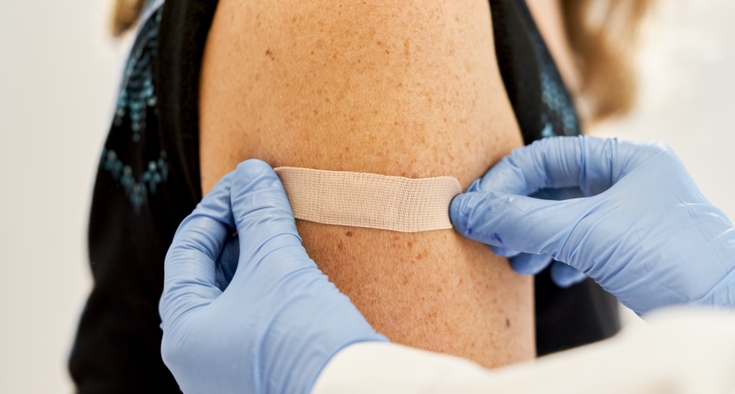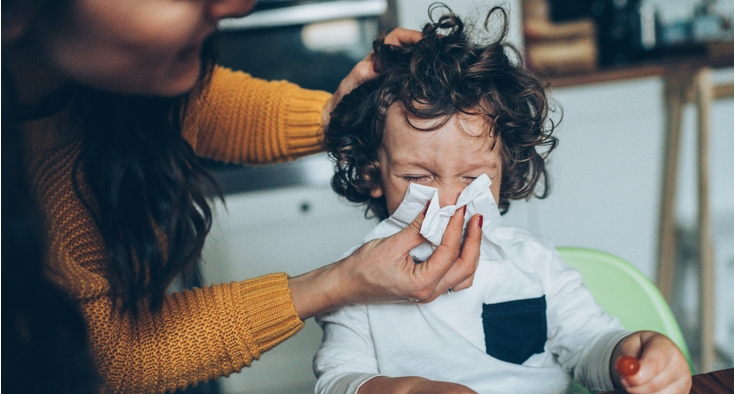Nothing brings a person to their knees quite like the stomach bug. If spending 24 to 72 hours being violently ill isn’t on your 2025 to-do list, read on.
What most of us call “a stomach bug” is often due to a highly contagious virus known as “norovirus” which causes the stomach or intestines to become inflamed, leading to stomach pain, severe nausea, diarrhea and vomiting. Sometimes all at once.
Norovirus is the leading cause of vomiting, diarrhea, and foodborne illness in the United States — an estimated 1 in 15 Americans gets norovirus each year — and it’s surging right now.
Thanks largely to a new strain of norovirus called GII.17 (P17), cases of norovirus in the U.S. from August 2024 to January 2025 were nearly double what they were over the same period of time last year, the Centers for Disease Control and Prevention reports.
But there are steps you can take to avoid contracting the virus, including washing hands with soap and water instead of hand sanitizer.
Here’s more advice from physician assistant Becky DeCamillis, of Novant Health Infectious Disease Specialists: Winston-Salem.
Get the best care for you and your family.
Q: If I’ve been exposed to norovirus, how long do I have before I’m sick?

Once exposed to the virus, most people develop symptoms 12 to 48 hours later.
Q: So if my child begins having diarrhea or my roommate begins throwing up, the clock is ticking?
Possibly. There are other reasons someone may have similar stomach symptoms, including bacterial causes (like C. diff, salmonella, listeria or E. coli) and parasite causes (like giardia), and other viral causes like enteroviruses or adenoviruses. But if someone in your household develops these symptoms while norovirus cases are surging, it’s probably norovirus. However, even if exposed, some cases are asymptomatic, meaning some people won’t develop symptoms of the virus.
What sets norovirus apart is that it has an extremely low “infectious dose,” meaning it takes only a few particles of the virus to infect someone — and infected persons shed a lot of virus, causing quick transmission from person-to-person.
It spreads when an infected person doesn’t wash their hands well after using the bathroom and touches things that others touch, or through airborne particles during vomiting. It can also spread through contaminated food or water.
Outbreaks have been recorded in long-term care facilities, schools, hospitals, camps, cruise ships and restaurants. A fun historical fact: norovirus used to be called “winter vomiting disease,” since it usually peaks during the winter. It’s also referred to as “Norwalk virus” because it was first identified in Norwalk, Ohio in 1968 when an outbreak occurred at an elementary school there.
Q: What can we do to avoid getting infected with norovirus?
Wash your hands frequently with lots of soap and warm water for at least 20 seconds, cleaning all your fingers and back of your hands. Alcohol-based hand sanitizers are much less effective against the virus. Always wash your hands after using the toilet, after changing diapers, before giving yourself (or someone else) medicine, and before you handle or eat food. If you know you’ve possibly been around norovirus, make a special effort to increase your handwashing.
Fruits and vegetables can be contaminated by norovirus, so wash fruits and vegetables before you eat them.
Shellfish (like oysters, clams, scallops and mussels) can also be contaminated so cook them to at least 145 degrees before you eat them, and don’t them raw or undercooked.
Q: What if I get sick from Norovirus?
Best doctors. Amazing nurses. Remarkable care.
There is no specific medication that kills the virus. Symptom onset is usually abrupt with vomiting and diarrhea. Try to drink fluids as you are able, taking small sips a few times every hour. Water is essential, but if you have a lot of vomiting, it’s also important to replace electrolytes with sports drinks or broth. Eat when you’re able (more detailed eating instructions below).
For breastfeeding mothers, it’s especially important to rehydrate as much as you can. Breastfeeding can help protect your baby by giving them antibodies to the virus.
For small children who have been vomiting, providing a very small amount of water or an electrolyte beverage through a syringe may help them avoid “chugging” (which can make them throw up again).
If you or your child cannot keep down liquids and develop signs of dehydration, such as dry mouth, lightheadedness, muscle cramping or dark urine, see your health care provider for evaluation.
Rest as much as you can and remind yourself: most cases of norovirus that occur in healthy adults last just a few days.
Q: What if someone in my house gets Norovirus?
Try to avoid them as much as possible while they’re actively sick. If they are old enough to stay in their own separate area (like a bedroom) and use one dedicated bathroom, that is ideal. If they aren’t: hand wash, hand wash, hand wash.
Clean everything they have touched while they are ill (especially any surfaces they contaminated with poop or vomit) with a bleach-based household cleaner.
Wash their clothes, towels, and linens on the highest heat setting available (then wash your hands again after handling their dirty items).
Don’t let them prepare any food or drink for you, and don’t share their food or drink.
The sick person should stay home until their symptoms have been improved for at least 48 hours. The virus is able to live on surfaces for days to weeks, and a person who has recovered from norovirus can still spread norovirus for four weeks or more after they feel better, which contributes to the contagiousness of the virus.
Q: Do I need to see or tell my doctor that I have norovirus?
If you are immunocompromised, you are more likely to have complications — so reach out to your doctor for guidance.
If you are not immunocompromised and are getting better after a few days, you do not necessarily need to see your doctor unless you're experiencing symptoms of dehydration. However, health departments do investigate outbreaks that occur, so feel free to call your doctor’s nurse line and let them know.
Q: When should I expect to feel better? And how long did I build immunity for?
Most people stop vomiting and/or having diarrhea within 72 hours or so from when symptoms started. However, your GI system may take several days to feel back to normal.
As you get back into eating, you may feel comfortable starting with foods like crackers, toast, applesauce, bananas, rice and chicken. Avoid caffeine, alcohol, sugary beverages, and fatty foods for a few days.
It’s unclear how long immunity really lasts and will vary from person to person, but probably is anywhere from a few months to a few years. However, since there are multiple strains of norovirus, immunity to one strain doesn’t confer protection to the others, so unfortunately we are at risk of getting norovirus repeatedly.
Q: Is there a vaccine to prevent norovirus?
Researchers have been working toward a norovirus vaccine for several years. Because there are so many strains of the virus, developing a single vaccine to protect against the most likely norovirus strain to cause illness in a particular season has been a challenge. However, we’re closer than we’ve ever been to a norovirus vaccine as there is a phase 3 trial ongoing right now.












